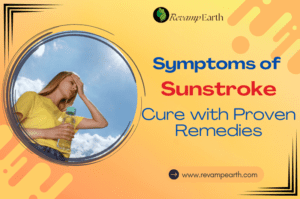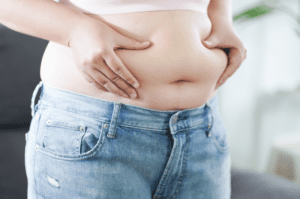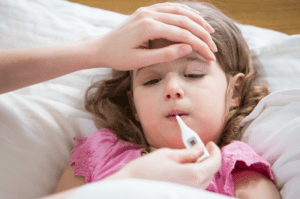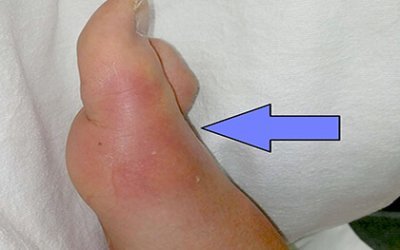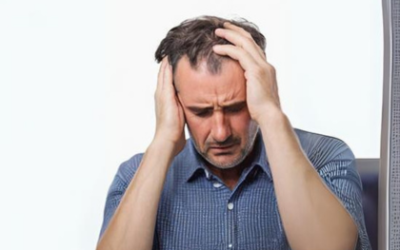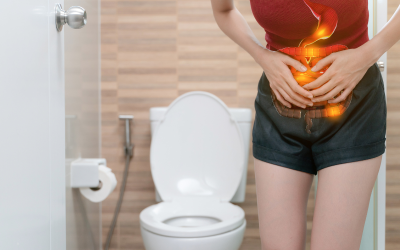How To Stop Hair Fall With Herbal Remedies?
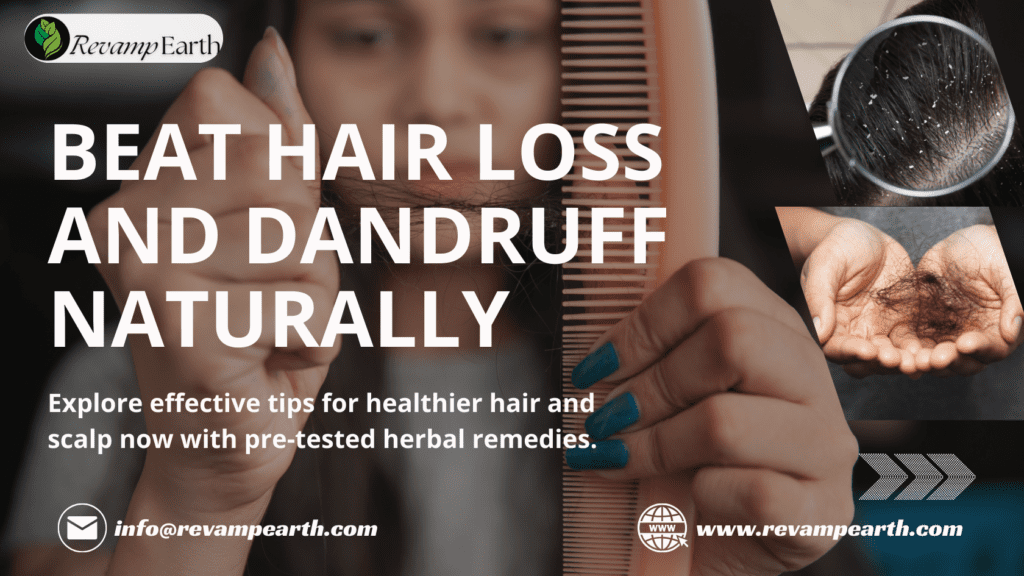
Welcome to a hair care journey like no other! In this blog, we’re delving into the twin challenges of hair loss and dandruff, Hair loss occurs when the hair follicles undergo a size reduction, leading to shorter and finer strands, eventually ceasing to grow altogether. While it is a natural part of the hair growth cycle to shed some hair daily, excessive hair loss may be a cause for concern. On the contrary, dandruff is characterized by the shedding of dead skin cells from the scalp, often accompanied by itching. This condition is linked to factors such as oily skin, stress, and certain skin conditions. This is often associated with the overgrowth of a yeast-like fungus on the scalp, resulting in flaky skin and irritation.
Possible Causes of Hair Loss:
Genetics (Hereditary Hair Loss):
Family history plays a significant role in determining susceptibility to hair loss. If your parents or grandparents experienced hair loss, you may be genetically predisposed.
Hormonal Changes:
Fluctuations in hormones due to factors like pregnancy, childbirth, menopause, or thyroid disorders can contribute to hair loss.
Medical Conditions:
Conditions such as alopecia areata, lupus, and diabetes can impact hair health, leading to increased shedding or thinning.
Emotional or physical stress can trigger a type of hair loss called telogen effluvium, where a significant amount of hair enters the resting phase and then falls out.
Inadequate intake of essential nutrients like iron, zinc, and vitamin D can contribute to hair loss.
Possible Causes of Dandruff:
Yeast Overgrowth (Malassezia):
Dandruff is often associated with an overgrowth of a yeast-like fungus called Malassezia on the scalp.
Oily Skin (Seborrheic Dermatitis):
Excess production of oil on the scalp can create an ideal environment for the growth of Malassezia, leading to dandruff.
Not Shampooing Enough:
Infrequent washing or inadequate removal of scalp oils can contribute to the accumulation of dead skin cells and dandruff.
Skin Conditions:
Conditions such as psoriasis or eczema can result in flaky skin, resembling dandruff.
Reaction to Hair Care Products:
Sensitivity or allergy to certain ingredients in shampoos, conditioners, or styling products may lead to dandruff-like symptoms.
Understanding these potential causes can help in identifying the root of the issue, enabling you to take appropriate steps for effective management and prevention. If you’re experiencing persistent hair loss or dandruff, consulting with a healthcare professional is advisable for a more accurate diagnosis and tailored treatment plan.
Understanding Symptoms
Hair Loss:
Increased Hair Shedding: Find more hair in your brush, on your pillow, or in the shower.
Thinning Hair: Noticeably reduced hair volume, especially at the crown or along the part.
Bald Patches: Small or large areas on the scalp where hair is completely absent.
Receding Hairline: The hairline gradually moves backward, creating a more pronounced forehead.
Itchy Scalp: Irritation or itching on the scalp, often accompanied by inflammation.
Dandruff:
Flaky Scalp: White or yellowish flakes on the scalp or hair, especially noticeable on dark clothing.
Itching: Persistent itching of the scalp, sometimes leading to redness.
Oily Scalp: Dandruff can be associated with either dry or oily skin, but an oily scalp is a common factor.
Scalp Irritation: Feeling discomfort or sensitivity on the scalp, often exacerbated by scratching.
Visible Flakes on Shoulders: Flake shedding onto shoulders or clothing, particularly noticeable when wearing dark colors.
Understanding these symptoms can help identify the underlying causes and choose effective herbal remedies for a holistic approach to hair care.

Management Strategies:
Healthy Diet:
Ensure a balanced diet rich in vitamins and minerals, especially those essential for hair health such as vitamin A, vitamin E, vitamin D, iron, zinc, and omega-3 fatty acids.
Include protein-rich foods like lean meats, fish, eggs, dairy products, nuts, and legumes.
Hydration:
Drink an adequate amount of water to maintain overall health, including the health of your hair.
Stress Management:
Practice stress-reducing activities like yoga, meditation, deep breathing exercises, or any other relaxation techniques. Chronic stress can contribute to hair fall.
Regular Exercise:
Engage in regular physical activity to improve blood circulation, which is essential for delivering nutrients to hair follicles.
Gentle Hair Care:
Avoid excessive heat styling, tight hairstyles, and harsh chemicals that can damage the hair shaft.
Use a mild shampoo and conditioner suitable for your hair type.
Pat your hair dry instead of rubbing it vigorously with a towel.
Avoid Tight Hairstyles:
Tight hairstyles like ponytails and braids can cause stress on the hair shaft and lead to breakage. Opt for looser styles.
Avoid Smoking and Limit Alcohol:
Smoking and excessive alcohol consumption can contribute to hair loss, so it’s advisable to quit smoking and moderate alcohol intake.
Medical Checkup:
Consult a healthcare professional or a dermatologist to rule out any underlying health issues that may contribute to hair fall.
Conditions like hormonal imbalances, thyroid problems, and certain medical treatments can affect hair health.
Topical Treatments:
Some topical treatments, like minoxidil, are FDA-approved for promoting hair growth. Consult a dermatologist to discuss the suitability of such treatments.
Prescription Medications:
In certain cases, prescription medications may be recommended to address underlying causes of hair loss. This could include medications to balance hormones or treat specific medical conditions.
Professional Treatments:
Procedures like PRP (Platelet-Rich Plasma) therapy and laser treatments may be considered under the guidance of a dermatologist or trichologist.
Exploring Herbal Remedies
Hair loss and dandruff, pervasive issues affecting many, stem from distinct causes. Hair loss, influenced by genetics, hormones, and health conditions, results in the gradual thinning or cessation of hair growth. Dandruff, characterized by flaky scalp skin and itching, often arises from the overgrowth of a yeast-like fungus. In our pursuit of effective solutions, we turn to herbal remedies, exploring natural alternatives backed by evidence to tackle these prevalent hair concerns. Understanding the factual basis of these issues is key to informed and targeted care for our hair.
1) Hibiscus and Fenugreek seeds:
It is a pre-tested remedy for which you need to soak 2 teaspoons of Fenugreek seeds overnight in a small cup of water, in a grinder, add 5-8 leaves along with 5-8 flowers of hibiscus (China rose plant) and add the soaked Fenugreek seeds, then grind it till a paste-like consistency forms. (It is recommended to use the same water that is used to soak fenugreek seeds.)
Apply it like a hair pack, massage gently on the scalp, and allow it to remain for 1 hour before rinsing it off. Most probably, the results can be visible after 1-2 weeks.
2) Aloe vera and gingelly oil:
Boil a mixture of equal quantities of leaf juice of aloe vera and gingelly oil till all moisture has evaporated. Apply on the head and massage for a few minutes before bed.
3) Carrot, alfalfa, and lettuce juice:
Make a juice out of 2 carrots along with 1 teaspoon of alfalfa seeds (sprouts also can be used) and some lettuce leaves. Have it in the morning (empty stomach) for better results.
4) Sweet flag or Calamus and coconut milk:
Mix 1 teaspoon of powdered root in 2 teaspoons of cold coconut milk and make a paste. Apply on the affected parts and allow it to remain for 1/2 hour before rinsing it off.
5) Henna/ Mehndi or the Egyptian privet and coconut oil:
Boil 2 cups of coconut oil (alternative-gingelly oil). when reaches the boiling point add a handful of henna leaves and allow it to splutter till it becomes red. Remove the burnt leaves and repeat the process for three or more handfuls of henna leaves. Then allow the oil to cool and bottle it.
massage gently on the scalp with this oil twice a day for at least 40 days to see the results. Remember the effect of Ayurveda can take time but it will definitely be a permanent solution to your problems.
References
- Muhamad Satria Mandala Pua Upa, Marce Inggritha Taku Bessi, Yulius Baki Korassa, Maria I.M. Indrawati. (2023) Ethnopharmacology Study of Traditional Herbs as Anti-dandruff and Anti-baldness in Amarasi District, Kupang Regency. Galenika Journal of Pharmacy. View
- Ameya Lanjewar, Soni Maurya, Devender Sharma, Anchal Gaur. (2020) Review on Hair Problem and its Solution. Journal of Drug Delivery and Therapeutics. View
- H.K.Bakhru (1992) Herbs That Heal: Natural Remedies for Good Health. Orient Paperbacks. Delhi, India.
- T.V.Sairam (1999) Home Remedies Vol-II: A Handbook of Herbal Cures for Common Ailments. Penguin Books India.
Dos
Maintain a Balanced Diet:
Ensure your diet includes a variety of nutrients, such as vitamins, minerals, and proteins, to support overall hair health.
Regular Scalp Massage:
Gently massage your scalp to stimulate blood circulation, promoting a healthier environment for hair growth.
Hydrate Adequately:
Drink sufficient water to keep your body and scalp hydrated, preventing dryness that can contribute to dandruff.
Use Gentle Hair Care Products:
Opt for mild, sulfate-free shampoos and conditioners to avoid stripping your hair of natural oils.
Herbal Treatments:
Incorporate herbal remedies like aloe vera, tea tree oil, or neem into your hair care routine for their beneficial properties.
Don’ts
Avoid Excessive Heat Styling:
Limit the use of heat styling tools like straighteners and curling irons, as excessive heat can damage hair.
Say No to Tight Hairstyles:
Avoid hairstyles that pull on the hair tightly, as this can contribute to hair breakage and traction alopecia.
Skip Excessive Chemical Treatments:
Minimize the use of harsh chemical treatments, such as perms or relaxers, as they can weaken the hair shaft.
Resist Overwashing:
Avoid overwashing your hair, as it can strip the scalp of natural oils, leading to dryness and potential irritation.
Steer Clear of Poor Nutrition:
Don’t neglect a balanced diet, as nutritional deficiencies can impact hair health. Include a variety of nutrient-rich foods in your meals.
Send Us A Message
FAQs
- Hair fall can be caused by a variety of factors including genetics (such as male or female pattern baldness), hormonal changes (such as those during pregnancy, menopause, or thyroid issues), stress, nutritional deficiencies, certain medical conditions (like alopecia areata or lupus), medications, and harsh hair treatments.
- Yes, stress can contribute to hair fall. Acute or chronic stress can lead to a condition called telogen effluvium, where more hair follicles enter the resting phase, resulting in increased hair shedding. Managing stress through relaxation techniques, exercise, and proper sleep can help reduce hair fall related to stress.
- To prevent hair fall naturally, maintain a balanced diet rich in vitamins and minerals (such as iron, zinc, and vitamins A and D), avoid tight hairstyles that pull on the hair, limit the use of heat styling tools and harsh chemicals, practice gentle hair care, and manage stress through relaxation techniques.
- You should see a doctor if you notice sudden or severe hair fall, patchy hair loss, or thinning hair. If you experience other symptoms such as itching, redness, or pain on your scalp, seek medical advice. A healthcare provider can determine the cause of your hair fall and recommend appropriate treatment options.


